
Yesterday, I opened here, in Saint Peter’s Basilica, the, after having opened it already in the Cathedral of Bangui in the Central African Republic. Today, I would like to reflect together with you on the meaning of this Holy Year, responding to the question: Why a Jubilee of Mercy? What does this mean?
The Church is in need of this extraordinary moment. I do not say: this extraordinary moment is good for the Church. I say: the Church is in need of this extraordinary moment. In our age of profound changes, the Church is called to offer her particular contribution, rendering visible the signs of the presence and closeness of God. And the Jubilee is a favorable time for all of us because, by contemplating the Divine Mercy, which surpasses every human limitation and shines on the darkness of sin, we can become more convinced and effective witnesses.
To turn one’s look to God, our Merciful Father, and to brothers in need of mercy, means to focus our attention on the essential content of the Gospel: Jesus, Mercy made flesh, which renders visible to our eyes the great mystery of the Trinitarian Love of God. To celebrate a Jubilee of Mercy means to put again at the center of our personal life and of that of our communities what is specific to the Christian faith, namely Jesus Christ, the merciful God.
Therefore, a Holy Year to live mercy. Yes, dear brothers and sisters, this Holy Year is offered to us to experience in our life the sweet and gentle touch of the forgiveness of God, his presence at our side and His closeness especially in moments of greatest need.
Therefore, this Jubilee is a privileged moment for the Church to learn to choose only “what pleases God most.” And, what is it that ‘pleases God most”? To forgive His children, to have mercy on them, so that they also, in turn, can forgive their brothers, shining as torches of God’s mercy in the world. This is what pleases God most. In a book that he wrote on Adam, Saint Ambrose takes up the history of the creation of the world and says that every day, after having made something, — the moon, the sun or the animals – “God saw that this was good.” However, when he made man and woman, the Bible says: “He saw that this was very good.” Saint Ambrose wonders: “But why does He say “very good”? Why is God so happy after the creation of man and woman? Because, finally, He had someone to forgive. This is beautiful: God’s joy is to forgive; God’s being is mercy. Therefore, in this year, we must open our hearts so that this love, this joy of God fills all of us with this mercy. The Jubilee will be a “favorable time” for the Church if we learn to choose “what pleases God most,” without yielding to the temptation of thinking that there is something else that is more important or a priority. Nothing is more important to choose than “what pleases God most,” namely, His mercy, His love, His tenderness, His embrace, His caresses!
The necessary work of renewal of the institutions and the structures of the Church is also a means that must lead us to have the living and vivifying experience of God’s mercy, which alone can guarantee that the Church is that city placed on the mountain that cannot remain hidden (cf. Matthew 5:14). Only a merciful Church shines! If we were to forget, even for a moment, that mercy is “what pleases God most,” every effort of ours would be in vain, because we would become slaves of our institutions and of our structures, no matter how renewed they are. But we would always be slaves.
“To feel strongly in us the joy of being found again by Jesus, who as Good Shepherd came to find us because we were lost” (Homily in the First Vespers of Divine Mercy Sunday, April 11, 2015): this is the objective that the Church sets for herself this Holy Year. Thus, we will reinforce in ourselves the certainty that mercy can really contribute to the building of a more human world. Especially in these our times, in which forgiveness is a rare guest in the ambits of human life, the call to mercy is more urgent, and this in every place: in society, in institutions, in work and also in the family.
Someone, of course, could object: “But Father, should not the Church do something more in this Year? It’s right to contemplate God’s mercy, but there are many urgent needs!” It’s true, there is much to do and I, for one, never tire of recalling it. But it is necessary to keep in mind that, at the root of the forgetfulness of mercy, there is also self love. In the world, this takes the form of the exclusive search of one’s interests, of pleasures and honors joined to the desire to accumulate riches, while the life of Christians is often crossed by hypocrisy and worldliness. All these things are contrary to mercy. The motions of self-love, which render mercy foreign in the world, are so many and numerous that we are often unable to recognize them as limitations and as sin. See why it is necessary to recognize ourselves sinners, to reinforce in us the certainty of Divine Mercy. “Lord, I am a sinner; come with your mercy.” This is a most beautiful prayer. It’s an easy prayer to say every day: “Lord, I am a sinner; come with your mercy.”
Dear brothers and sisters, I hope that, in this Holy Year, each one of us will experience God’s mercy, to be witnesses of “what pleases Him most.” Is it of the naive to believe that this can change the world? Yes, humanly speaking it is of the foolish, but “the foolishness of God is wiser than men, and the weakness of God is stronger than men” (1 Corinthians 1:25).
I greet the English-speaking pilgrims and visitors taking part in today’s Audience, including those from Scotland, Denmark, Indonesia, Japan, Canada and the United States of America. My special greeting goes to the international team of the space programme Galileo. Upon you and your families I invoke the Lord’s blessings of joy and peace. God bless you all!
A cordial welcome to the Italian-speaking pilgrims! I am happy to receive the Missionaries of Charity, the Dives in Misericordia Association of the diocese of Piazza Armenia; the Caffo Group of Limbadi and the artists of the Don Bosco Foundation in the World.
Yesterday, on the Solemnity of the Immaculate Conception, we began the Jubilee of Mercy. May the Virgin Mary intercede for us, so that this Holy Year is rich in copious fruits and, that everyone experiences God’s care for us. May she guide our action according to the works of corporal and spiritual mercy, which we are all called to live.
A greeting goes to young people, the sick and newlyweds. May the Mother of Jesus teach you, dear young people, to receive in your heart the birth of the Savior; may she help you, dear sick, to entrust yourselves always to the arms of Divine Providence; and may she grant you, dear newlyweds, to make of mercy the criterion of your spousal life.

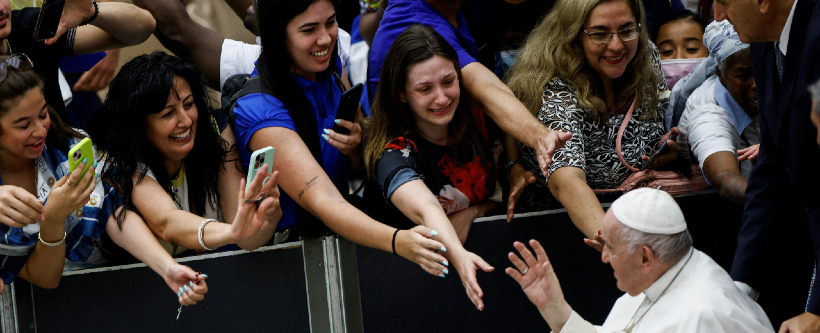
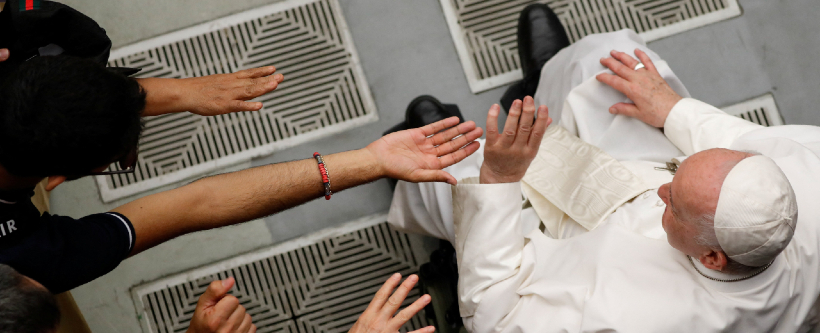
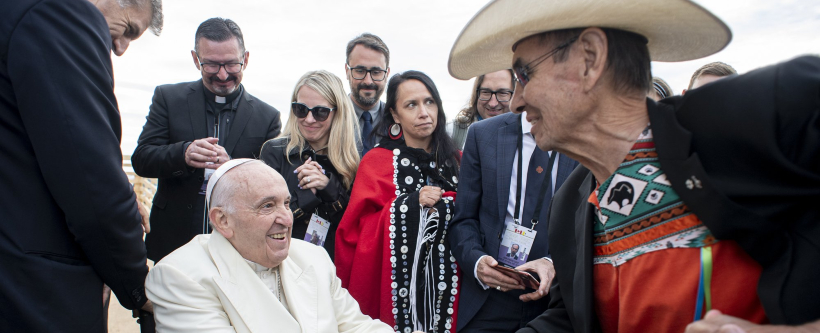
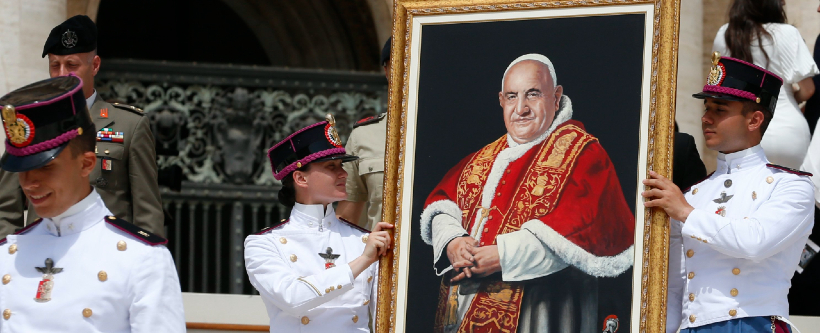
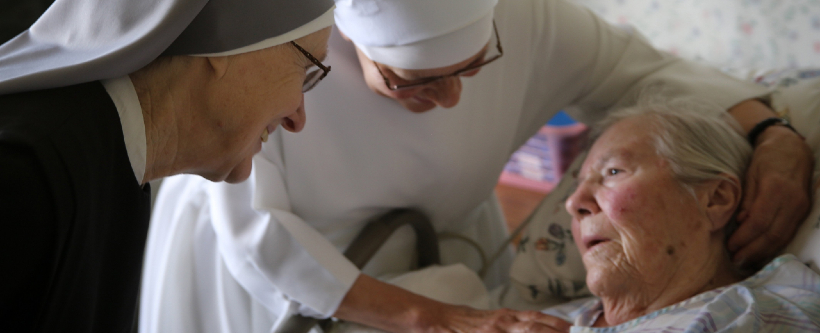
Facebook Comments